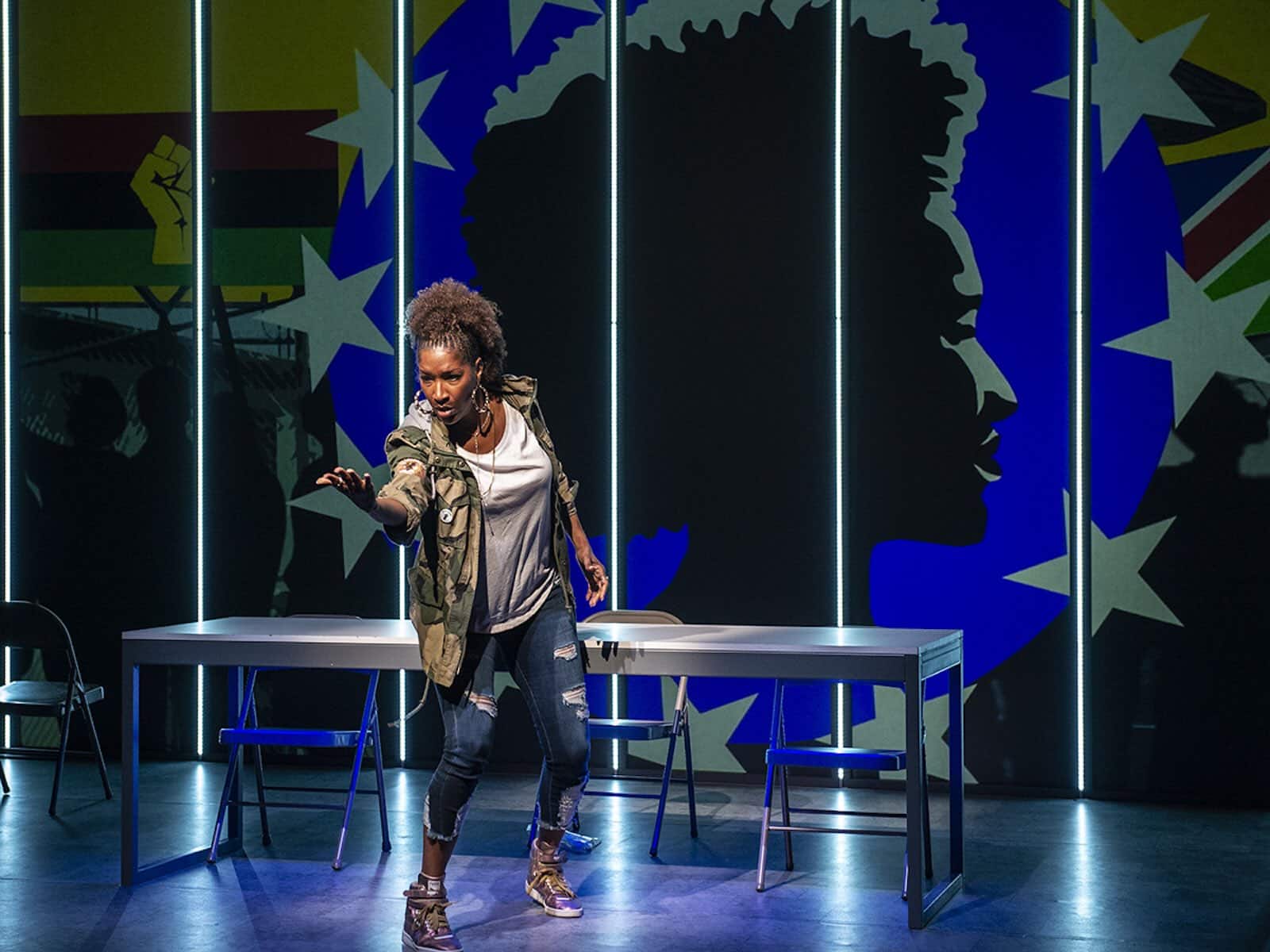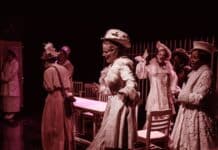“Soon as you hear the handcuffs go ka-klink, you hear the cash register go cha-ching.” This line in The Peculiar Patriot, currently playing at Baltimore Center Stage, summarizes the loss of humanity that often goes unnoticed in the American prison system. So often, prisoners are seen as “less than” except by the people who love and care for them outside of the prison walls. This one-woman play, written and performed by Liza Jessie Peterson and directed by Talvin Wilks, offers a unique perspective on the realities of American prisons, presenting a mix of laughter and pain.
There is a rawness at the heart of The Peculiar Patriot that is both tender and defiant. This show is anchored in the character of Betsy LaQuanda Ross, a woman who visits her best friend in prison, brings neighborhood gossip, stitches quilt-squares for each incarcerated “street soldier,” and, beneath the surface chatter, tears away the veneer of America’s “tough-on-crime” self-image. Through Betsy, Peterson gives voice to the communities too often spoken about rather than with.

From the moment the stage lights up and the monitors turn on, you’re in a visitors’ room of an Upstate New York prison: the beige walls, the metal chairs, the vending machine snacks, the general coldness (scenic design by Andrew Cissna). Into that space comes Betsy’s sound, edge, and humor. She jokes. She remembers. She scolds. And gradually, the viewer realizes the jokes are a shield, the memories a lament, the scolding a call-to-arms. Peterson doesn’t lecture from a podium; she sits across the folding table as though she’s talking to you, and you’d better listen.
What’s remarkable is how the show balances heartbreak with wit. Too often, pieces about incarceration become abstract, numbing audiences with statistics and rhetoric. But here, layers of character and particular detail keep the story alive. We laugh when Betsy recounts a juvenile-detention quilt class (“They gave me the nickname Betsy Ross ’cause I was sewing quilts in juvie”). You shift uncomfortably when she starts sharing the history, the numbers, and the data of what is behind the so-called “criminal justice system,” recoiling at the truth of this profit machine, fed on human lives and broken families.
Peterson’s performance is superb. In the best solo shows, the performer disappears into the world she’s created; here, Peterson melds with Betsy so completely that you forget that this is a play as you witness the atrocities known as “business as usual.” The rhythm of the script — the pauses, the reveals, the laughter turned quiet — feels both urgent and intimate.
The true power of The Peculiar Patriot lies in its duality. It is a love story, yes — a love story of friends separated by walls, of women who refuse to let the world forget those behind bars. But it is also an indictment: of racialized incarceration, of a society that builds plantations of prisons, of the invisible labor of those who visit, call, hope. Peterson writes: “Our country is rooted in the system of slavery … The 13th Amendment declares slavery is illegal except for the punishment of a crime. Prisoners are allowed to be slaves.” The individual is part of a system, and Peterson knows that. The Peculiar Patriot insists that what we’re seeing is not a broken system but a designed one.
For me, the show left me thinking not only about the incarcerated but also about the visitors: those families who wait at night at freezing bus stops, who show up after five-hour rides, whose arms hold the quilt but whose hearts carry silence. The image of Betsy adding quilt-squares — each square a name, a story, a memory — was haunting.
In my reading, this is not just theater; it is civic engagement in costume. It asks us: What does it mean to love your country when your country locks up your loved ones? What does patriotism look like when the flag is draped over prison walls, when the parade down Main Street is led not by a marching band but by a prison bus — the nation’s twisted hype man? The title captures the paradox: a “peculiar patriot” is someone who doesn’t salute the guns or the anthems but visits the cells, holds the ledger, and carries the quilt. It is peculiar because it demands you look where you don’t want to. It is patriotism because it cares for those the nation forgot.
If you have the chance to see this production live, it will challenge you, soften you, unsettle you — but in the best way. It will make you laugh, and then quietly burn with the question: How many squares are on the quilt? How many visits have been made? How many lives intersect with the system?To sum up: The Peculiar Patriot is powerful. It is humane. It is urgent. It is art with its fist raised, wrapped in a hand that offers a hug. It isn’t comfortable — but it doesn’t pretend to be. It is necessary.
Running Time: 90 minutes, with no intermission.
The Peculiar Patriot plays through November 9, 2025, at Baltimore Center Stage, 700 North Calvert Street, Baltimore, MD. For tickets ($10–$90, with senior and student discounts available), call the box office at (410) 332-0033 (Tuesday through Friday, noon–5 pm), email boxoffice@centerstage.org, or purchase them online.
The program is online here.
CREATIVE TEAM
Playwright/Actor: Liza Jessie Peterson
Director: Talvin Wilks
Stage Manager: Alexis E. Davis
Stage Manager: Nicholas Carlstrom
Asst. Staged Manager: Sharon Zheng
Scenic/Lighting Designer: Andrew Cissna
Asst. Scenic Designer: Peter Leibold
Costume Designer: Latoya Murray-Berry
Sound Designer: Luqman Brown
Projection Designer: Katherine Freer
Asst. Projections Designer & Programmer: Desne Wharton
Properties Manager: Belynda M’Baye
Hair/Wig/Makeup Designer: Larry Peterson
Tour Producer: James Blaszko
Executive Producer: Lena Waithe
Production Asstistant: Khalil White



